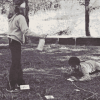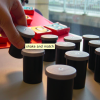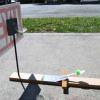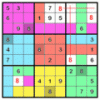Search Results
Showing results 221 to 240 of 276

Fantastic Four: A Math Card Game
Source Institutions
This is a game that is sure to sharpen players' basic math skills. Players must use four randomly selected numbers to create an equation that equals a fifth number.

Rock Cycle Roundabout
Source Institutions
In this activity, learners will learn how igneous rock, metamorphic rock, and sedimentary rock are formed as part of the rock cycle and that the same forces that produce/change rocks also produce/chan

Find My Card
Source Institutions
In this activity, learners find the answer to the question, "if you have a pile of 8 cards, and you remove half, then half again, how many times can you do this until you get to just one card?" This w

Silent Stalking
Source Institutions
In this outdoor game, learners role play predator and prey to explore the importance of keen hearing and silent stalking skills in the animal world.

¡La colocación de seis tarjetas!
Source Institutions
En esta tira cómica, Cientina le enseña a Mateo un truco de lógica nuevo con seis tarjetas.

Cup Sailing Game
Source Institutions
In this online Flash game, learners will captain a sailing challenge, adjusting boat direction and sails, seeking the way to take greatest advantage of varying wind speeds and directions to catch the
Look Around: Hunt For Sizes, Shapes and Numbers
Source Institutions
In this activity, learners will participate in a scavenger hunt involving sizes, shapes, and numbers. This activity works well with a whole group, individuals, or families.

Shake and Match
Source Institutions
In this activity, learners create a hearing based memory game that they can share with friends.

Copy Cats
Source Institutions
In this math activity, learners use what they know about shapes to copy a friend's hidden picture. Learners create a design out of pattern blocks and then hide their picture behind a screen.

Parabola Basketball
Source Institutions
In this activity, learners build mini-basketball courts and explore the laws of physics. Learners discover that everything you throw or shoot on earth travels in a parabola.

Smart Domino Tricks
Source Institutions
In this activity, you take regular dominoes, and turn them into conductive switches that can turn on a LEGO RCX block or Pico Cricket (micro controller). LEGO RCX block or Pico Cricket is required.

Plant Hunt
Source Institutions
In this outdoor activity and game, learners collect and sort leaf samples to determine how many types of plants grow in the activity site.

Audio Boggle: Make a Sound Track
Source Institutions
Audio Boggle is an activity that lets you listen to a track (that you make yourself) and see what you can hear!

Great Openings: Slots, 35 Sense, and Hole In One
Source Institutions
These three short activities challenge groups to fit objects through paper and index cards: "Slots" presents the challenge for one learner to figure out which objects fit through a hole cut by another

Color Sudoku
Source Institutions
The popular sudoku puzzles use numbers, but the game could played with any set of 9 different objects!
Coincidental Colonization
Source Institutions
In this game of chance, learners will discover how organisms colonized the Galápagos Islands, experiencing how chance plays a role in the successful dispersal of species to new areas.

Mystery Noises
Source Institutions
In this game (4th activity on the page) about hearing, learners test their ability to identify various sounds without looking.
Spin to Win!
Source Institutions
In this math activity, learners play a probability game and try to be the first to get to the end of the game board path .This activity guide contains a material list, black line masters for the game

Games from Around the World
Source Institutions
This lesson (on pages 46-55 of PDF) features two strategy board games -- one from Ghana and one from China. The first game, Achi, is a cross between checkers and tic-tac-toe.

Get-Moving Game
Source Institutions
In this invention challenge activity, learners create an indoor game for one or two people that gets you moving.
